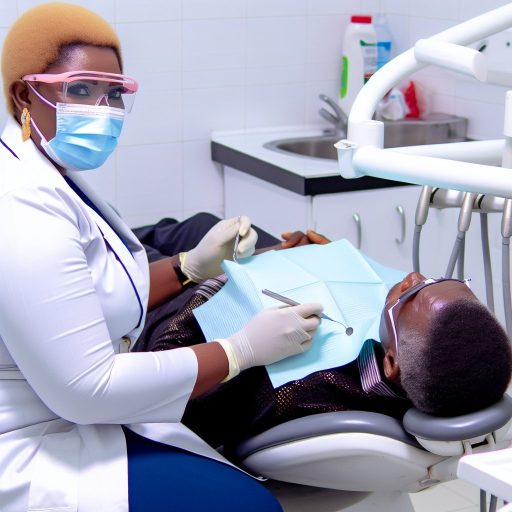Introduction:
Biomedical technology in Nigeria involves the use of modern equipment for medical purposes.
Ethical considerations are crucial in ensuring that advancements benefit society responsibly.
Overview of biomedical technology in Nigeria
Biomedical technology in Nigeria refers to the application of scientific knowledge to improve healthcare services.
It involves the use of advanced equipment and techniques to diagnose, treat, and prevent diseases.
Types of biomedical technology used in the country
- Medical Imaging Technology: This includes X-ray, MRI, CT scan, and ultrasound for diagnosing various medical conditions.
- Biomedical Engineering: Involves designing and maintaining medical equipment such as pacemakers, prosthetic limbs, and dialysis machines.
- Telemedicine: Enables healthcare professionals to remotely diagnose and treat patients using telecommunications technology.
- Laboratory Technology: Involves the use of advanced equipment for conducting tests and analyzing samples for accurate diagnosis.
Impact of these technologies on healthcare in Nigeria
- Improved Diagnosis: Biomedical technology has enhanced the accuracy and speed of diagnosing various diseases.
- Quality Treatment: Patients receive better treatment options and personalized care through the use of advanced biomedical technologies.
- Remote Healthcare: Telemedicine has bridged the gap between healthcare providers and patients in remote areas, improving access to healthcare services.
- Enhanced Research: Biomedical technology has facilitated medical research and the development of new treatments and drugs.
- Capacity Building: The use of advanced technology has led to the training and development of skilled professionals in the healthcare sector.
- Efficient Healthcare Delivery: Biomedical technology has streamlined healthcare processes, leading to faster service delivery and improved patient outcomes.
- Cost-Effective Solutions: By utilizing advanced technology, healthcare facilities in Nigeria can provide cost-effective solutions to patients.
Overall, the use of biomedical technology in Nigeria has significantly improved the quality of healthcare services and outcomes for patients across the country.
Lack of regulations and oversight
Biomedical technology in Nigeria is plagued by the absence of stringent regulations and oversight mechanisms.
The lack of regulatory framework exposes patients and healthcare providers to risks and uncertainties.
Without proper guidelines, there is a potential for misuse and abuse of biomedical technologies in the country.
Informed consent and patient autonomy
Another ethical issue in biomedical technology is the issue of informed consent and patient autonomy.
Patients need to fully understand the risks and benefits of procedures before giving consent.
In some cases, patients in Nigeria may not be fully informed or may not have the capacity to make decisions about their healthcare.
Privacy and data security concerns
With the increasing use of digital health technologies, there is a growing concern about privacy and data security.
Patient data is often stored and shared electronically, raising questions about confidentiality and protection.
Nigeria needs robust data security policies to ensure that patient information remains secure and confidential.
Equity in access to biomedical technologies
One of the key ethical challenges in Nigeria is the issue of equity in access to biomedical technologies.
Access to cutting-edge treatments and diagnostic tools is often limited to urban areas and wealthy individuals.
This creates disparities in healthcare and exacerbates existing inequalities in the country.
Discover More: How to Choose the Right Ophthalmologist in Nigeria
Case studies of ethical dilemmas in Nigerian biomedical technology
One notable case study is the issue of informed consent in clinical trials conducted by pharmaceutical companies.
Another example is the unauthorized use of patients’ tissue samples for research without their knowledge or consent.
There have been instances of researchers exploiting vulnerable populations for experimental purposes without proper ethical oversight.
Examples of controversial research or medical practices
An example of a controversial research practice is the use of genetically modified organisms (GMOs) in food production.
Another controversial practice is the use of experimental drugs on patients without adequate testing or FDA approval.
The use of gene editing technologies like CRISPR-Cas9 raises ethical questions about potential misuse and unintended consequences.
Discussion of the implications of these cases on ethics in the field
These cases highlight the need for stricter regulations and oversight in biomedical research in Nigeria.
They raise questions about the balance between scientific progress and ethical considerations in medical practices.
It is crucial for researchers, healthcare providers, and policymakers to prioritize ethical principles in all aspects of biomedical technology development.
You Might Also Like: Anaesthesiology and Patient Safety in Nigeria
Current regulations and initiatives addressing ethical issues.
- There are various regulations in Nigeria that aim to tackle ethical issues in biomedical technology.
- The National Health Research Ethics Committee Act is one of the primary laws governing research ethics.
- Other guidelines include the National Code of Health Research Ethics and the Guidelines for Gene Therapy Research.
- These regulations emphasize the importance of informed consent, confidentiality, and fairness in research practices.
Overview of existing laws and guidelines.
- The National Health Research Ethics Committee Act establishes the framework for ethical review of research.
- It outlines the composition of the committee, procedures for approval, and penalties for non-compliance.
- The National Code of Health Research Ethics provides detailed guidelines on conducting ethical research in Nigeria.
- It covers various aspects such as vulnerability of participants, informed consent, and data protection.
Analysis of the effectiveness of these regulations.
- While there are regulations in place, enforcement and compliance remain significant challenges in Nigeria.
- Many researchers and institutions may not adhere strictly to ethical guidelines due to lack of oversight.
- Cultural norms and practices also influence ethical decision-making in biomedical research.
- There is a need for greater awareness and capacity building to ensure the effective implementation of ethical regulations.
- Collaboration between government agencies, research institutions, and ethical review boards is crucial for upholding ethical standards.
Explore Further: Specializations in Physiotherapy: Nigerian Options

Challenges in promoting ethical standards in Nigerian biomedical technology
Resistance from stakeholders exists in promoting ethical standards.
Lack of regulatory frameworks poses significant challenges.
Pressure to prioritize profit over ethics affects the system.
Conflicting cultural beliefs further complicate ethical standards.
Inadequate enforcement mechanisms hinder compliance with ethical standards.
A fragmented approach to ethical guidelines leads to inconsistency.
Limited resources for monitoring and evaluation are a major setback.
Cultural and societal factors influencing ethical decision-making
Traditional practices often conflict with modern standards.
Transform Your Career with Expert Guidance
Get personalized mentorship consulting that’s tailored to your unique path. Our expert advice is actionable and exclusive.
Get StartedHierarchical structures affect power dynamics in decisions.
Mistrust towards healthcare institutions undermines ethical practices.
Stigma surrounding certain medical procedures persists.
Religious beliefs play a significant role in shaping perspectives.
Community expectations influence individual choices significantly.
Family dynamics impact healthcare decisions and ethical considerations.
Lack of awareness and education on ethical issues
Limited access to ethical training programs remains a barrier.
Insufficient emphasis on ethical dilemmas in education exists.
Language barriers hinder effective communication of ethical issues.
Low literacy rates adversely affect understanding of ethics.
Lack of public discourse on ethical concerns persists.
Minimal funding for ethics education initiatives is a concern.
There is a lack of mentorship for future ethical leaders.
Role of healthcare professionals and institutions in upholding ethical standards
Healthcare professionals are responsible for ethical decision-making.
They serve as advocates for patient rights and autonomy.
Obligation to disclose potential conflicts of interest is essential.
They are accountable for ensuring patient confidentiality always.
Healthcare providers must supply unbiased information for informed consent.
They play a key role in shaping ethical policies and guidelines.
Finally, they serve as role models for ethical behavior in healthcare.
Uncover the Details: Radiographers’ Code of Ethics in Nigeria
Ethical Considerations in Biomedical Technology
Ethical considerations in biomedical technology in Nigeria play a crucial role in safeguarding the well-being of individuals.
They also maintain the trust of the public.
It is imperative for stakeholders in the field to prioritize ethical practices.
This prioritization ensures the integrity and efficacy of healthcare services.
Adherence to ethical standards promotes the responsible advancement of biomedical technology.
Moreover, it fosters a culture of accountability and transparency.
By upholding ethical principles, stakeholders can mitigate potential risks.
They can also enhance patient safety and foster a positive reputation for the industry.
Therefore, I urge all stakeholders to actively commit to upholding ethical standards.
This includes policymakers, healthcare providers, researchers, and regulatory bodies.
It is only through a collective effort to prioritize ethics that we can harness the full potential of biomedical technology.
This effort ultimately benefits society.
Additional Resources
Ethical Review of Research Involving Human Subjects in Nigeria …
(PDF) Knowledge of medical ethics among Nigerian medical doctors




